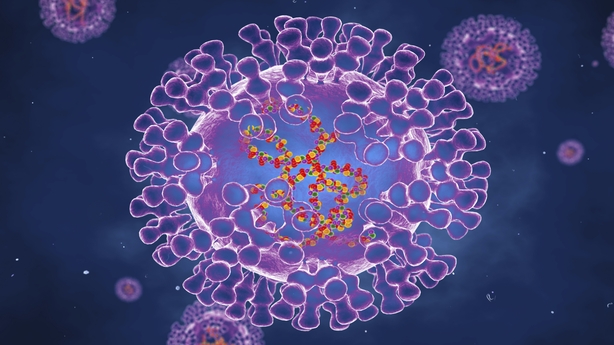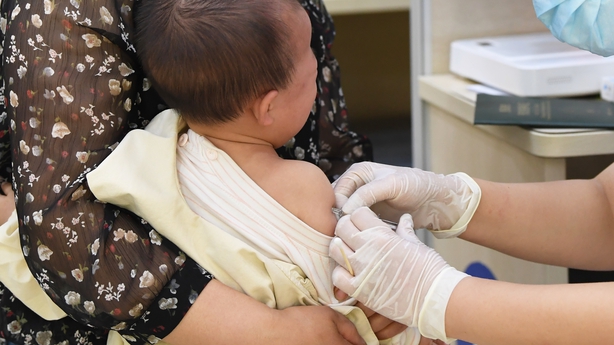There has been a significant increase in the number of hospitalisations due to complications with chickenpox so far this year.
Some 57 cases of hospitalised chickenpox have been recorded to date.
Three quarters of these were in children under the age of 15, while just over half were in children aged four and under.
This compares to just 15 hospitalised cases during the same period in 2022.
It is also significantly higher than the number of cases pre-pandemic.
The median number of hospitalised chickenpox cases for the same time period between 2012 and 2019 was 34 (ranging from 19 cases in 2015 to 41 cases in 2017).
In a statement, the Health Service Executive said that with the unwinding of pandemic restrictions, there has been an upsurge in a wide range of infectious diseases, including chickenpox.
The HSE has said that the number of cases of hospitalised chickenpox was higher than expected when compared to previous years.
It said levels of childhood infectious diseases like chickenpox are normally lower during the summer months but due to changes in the patterns of how these diseases spread following the pandemic, there is a possibility that levels could remain elevated for a longer period.

GPs see increase in cases
Dr Scott Walkin, a GP in Ballina, Co Mayo, who works with the Irish College of General Practitioners as its lead for antimicrobial resistance and infection, said he has noticed a clear increase in cases of chickenpox.
“It is something I have noticed in practice,” he said.
“I spoke with a number of hospital doctors yesterday, they’ve said the same thing and I spoke with some doctors yesterday who are based in general practice. They’ve also noticed an increase in the number of chickenpox cases.”
Dr Walkin said the pandemic prevented a large number of children who would otherwise have contracted the virus from getting it, until now.
“We’ve had a number of years where we haven’t been mixing very much,” he said.
“And chickenpox is a highly contagious condition and it’s transmitted from person to person.
“So if we’re mixing with each other less, there’s less opportunity for the chickenpox to be transmitted.
“That has resulted in a larger cohort at this particular time, a larger group of people who are susceptible to chickenpox.
“What that means is that there’s more people that can get it and therefore more people have gotten it.”
Dr Walkin says chickenpox is not a serious condition for the overwhelming majority of people but in rare cases it can result in severe complications ranging from skin and chest infections, to pneumonia and brain conditions.
He said that while around 55,000 people a year get chickenpox only a small number are admitted to hospital.
Parents of children with chickenpox should keep their child’s fingernails short and should not use medicines like Nurofen and ibuprofen, which slightly increase the risk of infection, he said. Use paracetamol instead, he added.
He also recommends using antihistamines and moisturiser, adding that oatmeal baths often prove quite effective.
Parents who are worried should seek a medical opinion, Dr Walkin advised.

HIQA
Last month, the Health Information and Quality Authority began a public consultation on whether the chickenpox vaccine should be added to the routine childhood immunisation schedule.
The chickenpox vaccine requires two doses and can be obtained from your GP. The total cost may range from €150 to €180.
HIQA’s Chief Scientist Dr Conor Teljeur said that vaccines against chickenpox have been available for over 30 years and that in Ireland, the vaccine is already recommended for non-immune individuals in certain risk groups.
He said that many countries include vaccination against chickenpox in their childhood immunisation schedules however, the type of vaccine given, the number of doses and the timing of the doses differ.
Members of the public are invited to express their views about the chickenpox vaccine to HIQA before the deadline for submissions expires on 29 May.
